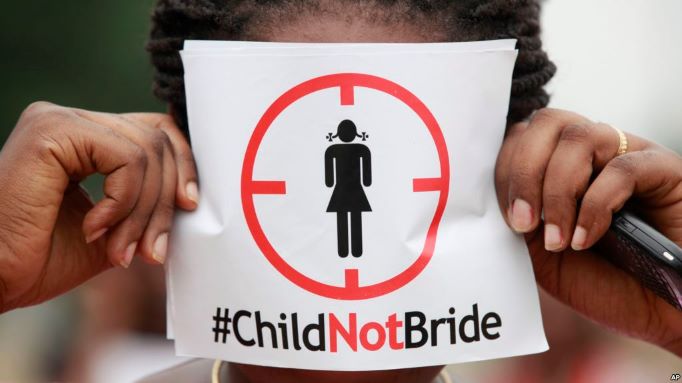As a girl growing up in California, Nicole handled pet snakes, bullfrogs and iguanas. She dreamed of becoming a veterinarian. But when she was 16 years old, she says she was pressured to marry a 25-year-old man.
Around the country, teenagers need to be at least 18 to get married on their own. But the laws in every state allow people to marry at younger ages with parental consent, and sometimes, a judge’s approval.
Nicole, who asked to be identified only by her middle name, says her marriage was orchestrated by her late grandmother — who believed a girl’s only purpose was to become a wife and mother. A judge also approved the union.
“I really thought that they were going to pull me aside and I was going to be able to back out of it,” she said. “I was expecting someone to ask questions, especially because of my age.”
The marriage ended after two years when her husband died in a car accident. Now, at 29, Nicole is asking lawmakers in California to set stricter rules around underage marriage.
Over the last two years, Democratic and Republican lawmakers in California and across the nation have been grappling with whether to rewrite decades-old laws that have allowed thousands of minors to marry legally. Lawmakers in 11 states have proposed measures to raise the minimum marriage age. So far, four bills have succeeded.
In June, Connecticut banned marriage before 16, New York raised its minimum marriage age from 14 to 17 and Texas set new rules that limit marriage to minors who have been emancipated — meaning a court has granted them the same rights as an adult.
Advocates for reform say existing marriage laws are failing to protect minors from being pressured or forced into marriage. They are campaigning to outlaw marriage before age 18.
But these measures have faced stiff resistance from lawmakers and groups across the political spectrum who are wary of completely banning marriage for minors. They say teenagers should be allowed to marry under certain circumstances. Pushback has come from women’s rights groups and the American Civil Liberties Union on the left, as well as libertarian politicians and abortion opponents on the right.
“I thought once I point this out and tell people what’s happening in your state, look at these archaic laws. It’s a no-brainer,” said Fraidy Reiss, the founder and executive director of Unchained at Last, a group that has been lobbying legislators to end child marriage. “I had no idea that it would be this difficult.”
The push for new protections currently being debated in California follows a failed bid to ban marriage before 18. That original effort was opposed by the ACLU, which argued that the proposal “unnecessarily and unduly intrudes on the fundamental right of marriage.”
“We’re not convinced that banning legal marriage will stop these coercive relationships from happening,” said Phyllida Burlingame, the reproductive justice policy director at the ACLU of California. “They will push these young women further from the reach of social services.”
The Children’s Law Center of California, which works with children in the state’s foster care system, also opposed the bill. It said some minors who are pregnant may not want their children to be born out of wedlock. The group also argued that raising the marriage age would strip minors of one of their only pathways to exit foster care through emancipation.
The bill has since been amended to set stricter rules for judges to follow when they’re deciding whether a minor can get married. It is being considered in the California Assembly and would require judges to interview minors and their prospective spouses separately. Courts would also have to report any suspicions about child abuse or neglect to child protective services.
“We now require the court to take some aggressive, proactive action in determining what is in the best interest of the child,” said State Senator Jerry Hill, a Democrat who proposed the initial ban. “That, to me, is a big win.”
200,000 Married Before Age 18
More than 200,000 minors were married in the United States between 2000 and 2015, according to a FRONTLINE analysis of marriage records. The data comes from 41 states and the largest counties in Arizona, Nevada and New Mexico. Figures were unavailable for several of the nation’s most populous states, including California and Pennsylvania.
The analysis shows that the number of minors marrying has fallen by more than half since 2000. Nonetheless, advocates say state laws remain weak and all too often fail to protect vulnerable minors from being pressured or forced into marrying.
It’s impossible to know the circumstances behind these marriages, as the records only reveal the age and gender of each party. But the data shows child marriage remains most common in states with large rural populations, like Idaho and Kentucky.
Almost 90 percent of the minors who married were girls. Most minors were 16 and 17 years old. In a handful of the most extreme cases, children as young 10, 11 and 12 were given marriage licenses in Alaska, Louisiana, South Carolina and Tennessee.
The majority of minors married adults who were 18, 19 or in their early 20s. Yet, several hundred minors were legally permitted to marry adults in their 40s, 50s, 60s and 70s.
Around half of all states do not set a minimum marriage age, according to the Tahirih Justice Center, a nonprofit that serves women and girls fleeing violence. In other states, minors have to be at least 14, 15, 16 or 17 to marry.
Most states set the age of sexual consent between 16 and 18, yet advocates point out that court clerks and judges have granted marriage licenses that effectively allow people to circumvent statutory rape laws. At a minimum, they say, judges need better training to identify whether a marriage is forced or coerced.
In 32 states, the judges who approve marriage are generalists, who typically come from probate, district or circuit courts, according to a forthcoming report by the Tahirih Justice Center. Underage marriage petitions in nine states are reviewed by judges who specialize in domestic relations, juvenile or family law.
“Judges only see a snapshot and they are not social workers,” said Jeanne Smoot, the senior counsel for policy and strategy at Tahirih. “They don’t see the 3-D image of all the kinds of threats that a girl might be facing outside that courtroom.”
Advocates say raising the marriage age to 18, with no exceptions, would ensure that minors have the same rights as adults before getting married. In some states, minors lack the ability to file a restraining order, access domestic violence shelters or seek a divorce on their own.
A Setback In New Jersey
This spring, Reiss’ home state of New Jersey was poised to become the first in the nation to adopt legislation banning all marriages involving minors. There is currently no minimum marriage age in New Jersey. In all, around 2,000 minors were married there between 2000 and 2015, according to data from the New Jersey Department of Health. The majority were 16 and 17 years old, and were married with parental consent.
The bill received near-unanimous support in the General Assembly and passed with just five “no” votes in the Senate. Gov. Chris Christie, a Republican, refused to sign the proposal into law. He urged lawmakers to instead consider banning marriage before 16 while still allowing 16- and 17-year-olds to marry with a judge’s permission.
In a memo to legislators, Christie voiced concern that an outright ban would “violate the cultures and traditions of some communities in New Jersey based on religious traditions.”
The bill also faced opposition from anti-abortion groups. New Jersey Right to Life, an organization that says it has around 50,000 members, urged the governor to veto the bill.
“Our concern is with the 16- and 17-year-old who becomes pregnant and wants to marry the father of her child if she wishes to do so,” Marie Tasy, the group’s executive director, wrote in an email. “If her parents are not supportive and are unwilling to help her, they may force her into having an abortion. Or, she may feel that she has no choice than to have an abortion.”
A new bill, which follows Christie’s guidelines, has been introduced in the state assembly. The bill lacks the support of advocates like Reiss who say it fails to adequately protect minors.
Defeats in New Hampshire and Maryland
As states attempt to rewrite the laws around child marriage, lawmakers are confronting a key question: When is someone too young to get married?
Days before New Jersey lawmakers passed their bill, legislators in New Hampshire voted down a measure that would have banned marriage before 18. Girls as young as 13 and boys as young as 14 can marry in New Hampshire with the consent of a parent and judge, according to a law that has been on the books since 1907. The bill was proposed by a 17-year-old girl scout, Cassandra Levesque.
“I was appalled. I was shocked that we still have that law in the books and that many other states still have that law in the books too,” Levesque said.
During a legislative hearing in March, Democratic representative Mary Beth Walz, who supported the ban, listed all the things that minors cannot do in New Hampshire due to laws that recognize “the physical and emotional immaturity of teens.”
“They cannot vote. They can’t sign a contract. They can’t sign a lease on an apartment. They can’t buy a car. They can’t buy a house. They can’t open a bank account. They couldn’t even toast themselves at their own wedding,” she said. “We do not treat children as adults when they’re under the age of 18.”
The proposal drew opposition from Republican lawmakers and some Democrats who said there were already safeguards in place, like requiring judges to approve all marriages involving a minor.
“This has been the policy in our state. It has been working,” said Rep. David Bates, a Republican who voted against the bill. “If we pass this we will be ensuring forever that every child born to a minor is born out of wedlock.”
Bates argued that the proposed ban would create more single-parent households. He also worried that soldiers, who may join the military at 17, might be prevented from marrying their partners before being deployed.
The New Hampshire House of Representatives voted to indefinitely postpone the bill.
One month later, in April, a similar proposal failed in Maryland.
Maryland allows 16- and 17-year-olds to marry with parental consent, though consent is not needed if the girl is pregnant. Fifteen-year-olds can only marry if they are pregnant and have permission from their parents. More than 3,100 minors were married in the state between 2000 and 2014. The majority who married were 16- and 17-year-old girls. At least 69 marriages involved pregnant teens marrying partners who had committed statutory rape, according to an analysis of state data by the Tahirih Justice Center.
American women who marry before the age of 18 are more likely to face psychiatric disorders like clinical depression, according to a nationwide study published by the American Academy of Pediatrics in 2011. A more recent survey from Texas Women’s University found that women and girls who were threatened with forced marriage reported higher instances of intimate partner violence.
“To me, the abuse that happens to these children, particularly young girls, who get married to significantly older men is the number one concern,” said Vanessa Atterbeary, a Democratic lawmaker who sponsored a bill to raise the marriage age to 18.
Atterbeary’s bill received some support from lawmakers on both sides of the aisle as well as the Maryland Catholic Conference.
Most lawmakers were unwilling to back an outright ban, though, and the Women’s Law Center of Maryland opposed the bill due to concerns that it would restrict choices for minors without preventing issues like forced marriages and sex trafficking.
“There are certain people that culturally, religiously — it is important for them to get married if they are pregnant,” said Michelle Siri, the executive


